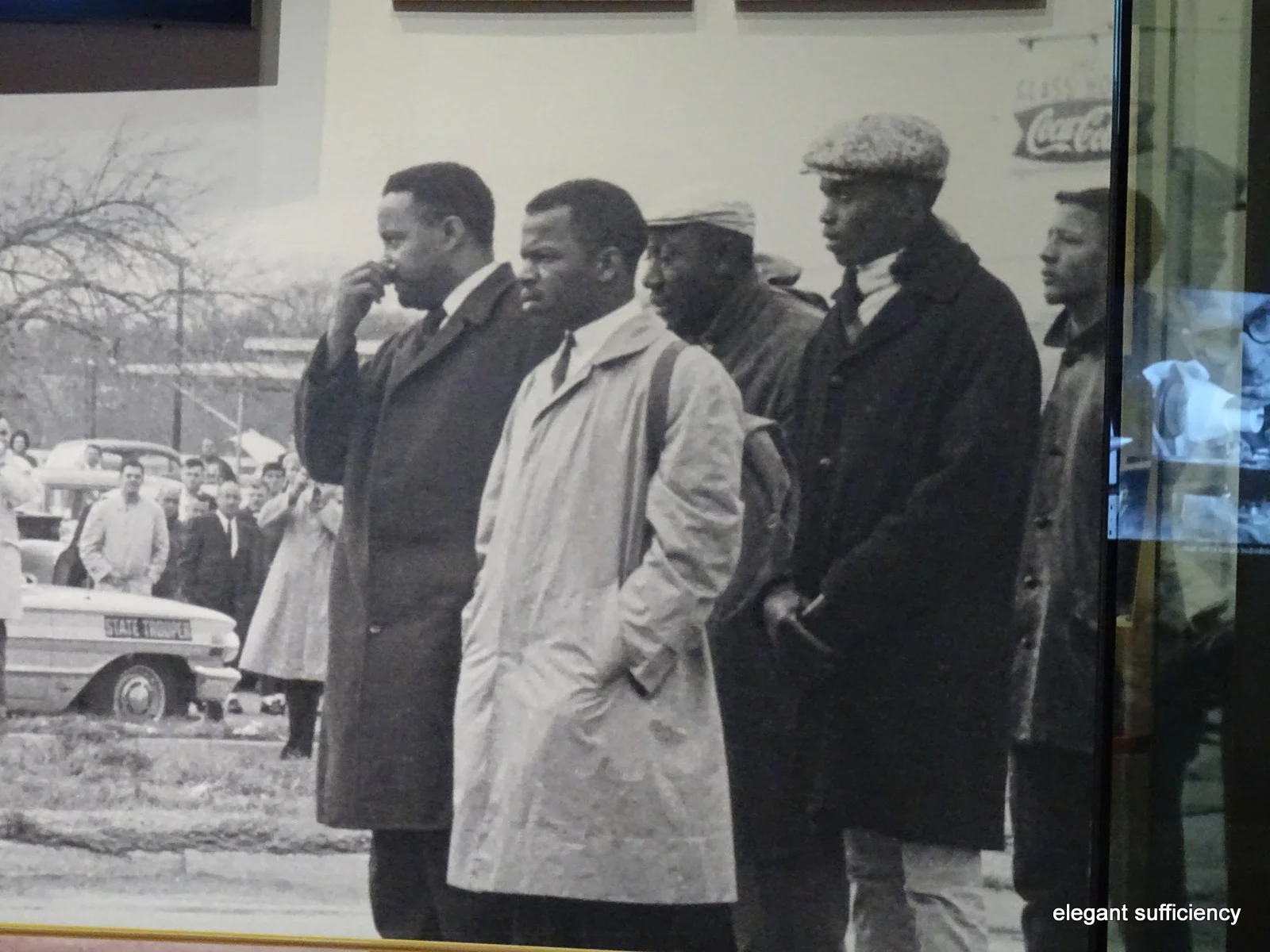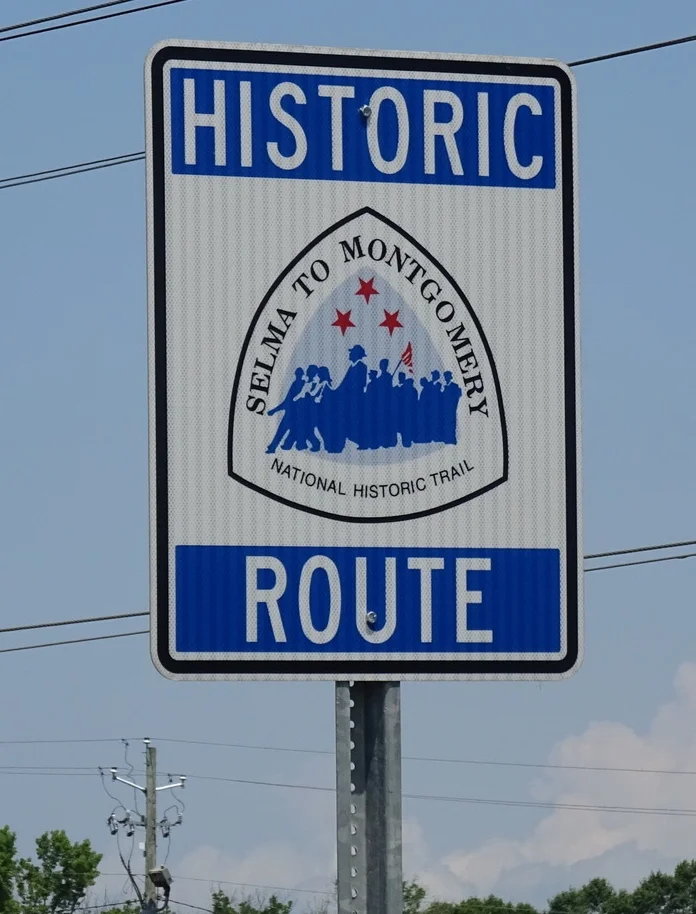We shall overcome
I’ve been trying to remember what I remember from those days when the events of the US Civil Rights campaign were unfolding. I was only just born when Rosa Parks refused to get off her bus, so it’s unsurprising that I don’t remember that. I was ten or thereabouts when the march from Selma to Montgomery took place and whilst I might have been more aware of that, I grew up in a community more concerned with events closer to home; reports of sunken trawlers and the Cod War with Iceland featured larger in my life than Civil Rights issues in a place so far from Hull.
One thing I do remember is the song We shall overcome though I think I remember it most clearly sung by Joan Baez. I really don’t know, but when I heard it today, that was the first link to my recollection of the events I am still learning so much about.
We’d set today aside for exploring Montgomery, capital of Alabama and the location of many events in both the Civil War and more recently, the campaign for Civil Rights.
We began at the State Capitol, shining white in the morning sunshine.
We enjoyed a tour with Sharren, our guide, who gave us a great deal of historical background and pointed out the most important features.
Unlike the Georgia Capitol building, this one was as decorative as others we’ve seen and looking up to the dome, we could learn about the major events in Alabama history, as painted by Roderick MacKenzie.
We were able to take a look inside both houses, though the business of governing Alabama now goes on in another building and these chambers were merely historic.
Our next stop was outside, under the portico, where Jefferson Davis was inaugurated in 1861 as the first and only President of the Confederacy, because we were to learn about the secession of Alabama on this, the day when thoughts of leave/remain were very much in our minds.
From here too, we could see where Governor George Wallace denied entry to the Capitol estate to the marchers who had come from Selma, when Martin Luther King turned his back on the Capitol and spoke to the crowd.
From here, we crossed the road to the first White House of the Confederacy: another troubling period of history altogether.
We were greeted enthusiastically by a couple of chaps who had a great deal of information to share and whose personalities alone filled the house. This was Jefferson Davis’s home whilst he was President though it didn’t always stand on this spot, having been moved from elsewhere in the city.
The house itself was quite grand and much of the furniture was original, having been bequeathed by Mrs Davis on her death.
Of course, there were nuances we simply didn’t get, like the significance of the titles of the songs on the piano, because it was quite clear that we were on Confederate territory here, even before we overheard the whispered advice to another visitor that “flags were available under the counter in the store upon request”.
It takes generations to overcome such allegiances; a particularly sobering thought on this, our Referendum day.
Our next stop was the Alabama Museum, where a variety of displays interested and entertained us.
Of course, one room told the story of the 1950s; of Hank Williams, Nat King Cole and segregation.
But had it not been for Mary, the significance of one image would have passed me by. She pointed out the gentleman in the light raincoat, identifying him as John Lewis, current Georgia politician and even today, making a stand. Being a “Civil Rights Legend” is a lifetime role, it seems.
He had been part of the Selma-Montgomery march which Governor Wallace had stopped in its tracks at the foot of the Capitol steps. Our next stop was to be the Civil Rights Memorial Centre and here we were keen to see the memorial itself, designed by the same architect as the Vietnam Veterans Memorial in Washington DC, Maya Lin.
Here was a powerful quote from Martin Luther King Jnr’s “I have a dream” speech
and a circular fountain listing the major events up to and including Martin Luther King Jnr’s assassination. Powerful and highly effective, I couldn’t help but feel that this was the kind of memorial MLK himself deserved.
Inside, we added our names to the wall.
because if we didn’t feel moved and inspired by the things we’d seen in the last 24 hours, then we would have hearts of stone.
And anyway, there was still Rosa. Rosa Parks; she of the bus incident in the year I was born.
It all happened here, by the fountain in the middle of Montgomery.
This quiet, unassuming woman’s action in refusing to get off the bus to allow a white man to sit in her place led to more than a year of boycotts of the buses here.
In the museum dedicated to her memory, there indeed was a bus and plenty of other material relating to the events which were triggered by Rosa Park’s actions that day. Yet more powerful and inspiring stuff about which I realise I knew so little until I came here.
So here we were, on a hot (97F) Alabama afternoon, standing and absorbing all of these gruesome stories and events. Suddenly, we felt we’d seen enough and felt rather overwhelmed by it all.
We also felt rather preoccupied by the events taking place back at home, where we had done all we could to ensure a secure future for our family by voting to remain in the EU, and could only await the outcome this evening. We’ve felt troubled by the campaign, have found ourselves at odds with friends who don’t share our opinions and for the first time ever, have openly spoken of our views and nailed our colours to the mast. Mindful of the two men in the Confederate White House too, we know such partisan behaviour lasts generations.
It was time to return to the hotel, to cool down and do a little journalling!
The Capitol Heights Baptist Church gave us a little giggle on the way.










